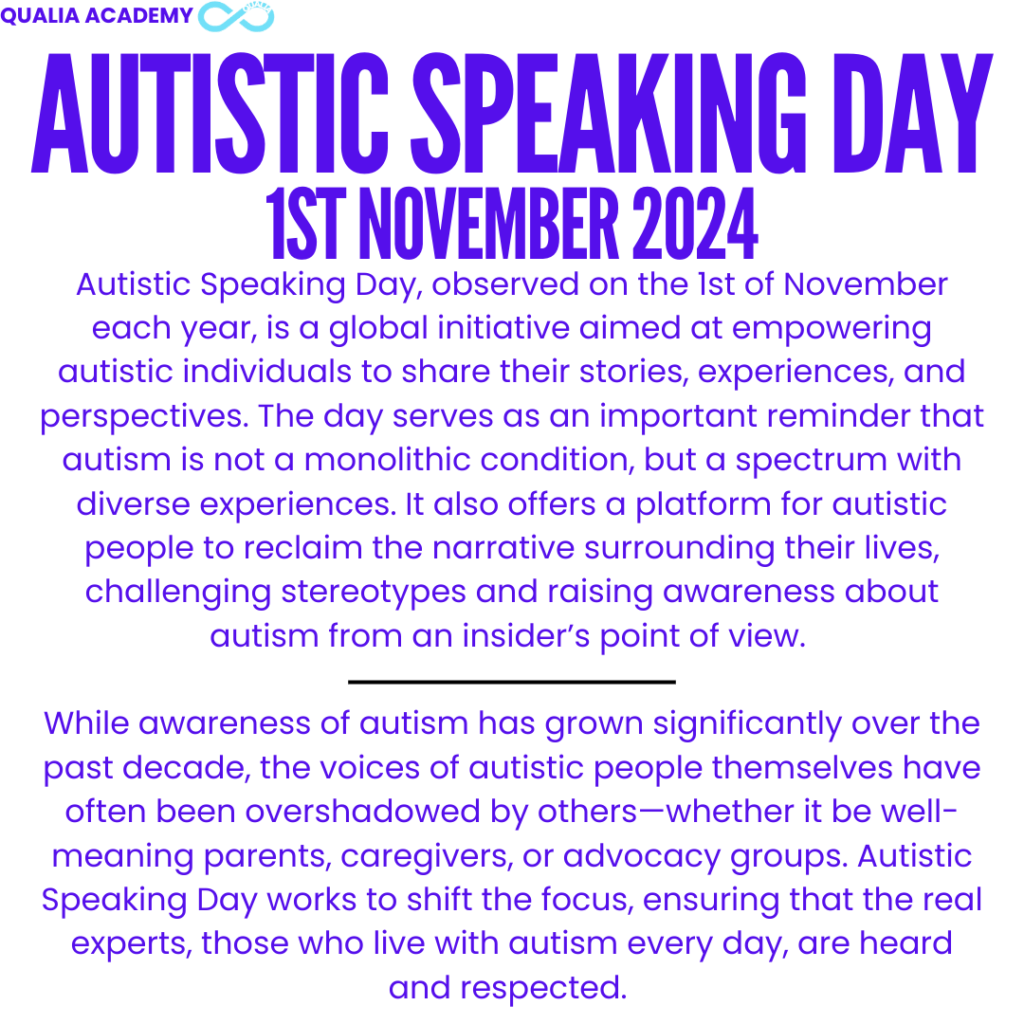
Autistic Speaking Day, observed on the 1st of November each year, is a global initiative aimed at empowering autistic individuals to share their stories, experiences, and perspectives. The day serves as an important reminder that autism is not a monolithic condition, but a spectrum with diverse experiences. It also offers a platform for autistic people to reclaim the narrative surrounding their lives, challenging stereotypes and raising awareness about autism from an insider’s point of view.
While awareness of autism has grown significantly over the past decade, the voices of autistic people themselves have often been overshadowed by others—whether it be well-meaning parents, caregivers, or advocacy groups. Autistic Speaking Day works to shift the focus, ensuring that the real experts, those who live with autism every day, are heard and respected.
The History and Origins of Autistic Speaking Day
Autistic Speaking Day was first launched in 2010 as a response to a campaign known as “Communication Shutdown,” which encouraged people to stay off social media for a day in solidarity with autistic individuals. Many within the autistic community found this problematic, as it essentially silenced both autistic and non-autistic people, rather than facilitating meaningful conversation or understanding.
In reaction to this, a group of autistic individuals came together to create Autistic Speaking Day, turning the narrative on its head. Instead of silence, they wanted dialogue. Instead of shutting down communication, they sought to open it up, encouraging autistic people to speak out about their experiences, challenges, and achievements. Through social media platforms such as Twitter, blogs, and Facebook, the movement has grown, creating a space where the autistic community can be seen, heard, and understood.
Why Autistic Speaking Day is Important
Autistic Speaking Day is not just about awareness; it’s about acceptance and understanding. While many campaigns focus on raising awareness of autism, too few focus on the lived experiences of autistic individuals and the nuances of what it means to navigate the world as an autistic person. Here’s why this day is particularly significant:
Empowerment Through Self-Advocacy
Autistic Speaking Day allows autistic people to define autism in their own words. Often, societal narratives about autism focus on what autistic people can’t do or how they are “different” from neurotypical individuals. By hearing directly from autistic voices, the world can begin to see autism not as a deficiency or something to be “cured,” but as a natural variation in human neurodiversity. The day empowers autistic individuals to share their stories and experiences without being filtered through someone else’s lens.
Challenging Misconceptions
Autistic people face many stereotypes and misconceptions. Some of the most common include that they lack empathy, have poor communication skills, or are intellectually impaired. Autistic Speaking Day gives autistic individuals the opportunity to break down these harmful stereotypes, allowing for more informed and nuanced conversations around autism. For example, many autistic people communicate differently, not ineffectively, and often have a deep sense of empathy that may just be expressed in ways that differ from neurotypical expectations.
Aiding the Neurodiversity Movement
The concept of neurodiversity emphasises that neurological differences, such as autism, ADHD, and dyslexia, should be recognised and respected as part of human diversity. Autistic Speaking Day aligns with this movement by promoting acceptance and understanding of autistic people as they are. Rather than pushing for interventions aimed at making autistic people more “normal,” the day encourages society to embrace neurodiversity and accommodate different ways of thinking, interacting, and experiencing the world.
How You Can Support Autistic Speaking Day
There are many ways to participate in and support Autistic Speaking Day, even if you are not autistic. Here are a few suggestions:
Listen to Autistic Voices
One of the best ways to support Autistic Speaking Day is simply to listen. Follow autistic individuals on social media, read their blogs, and watch their videos. Engage with their stories and take the time to understand the unique challenges and triumphs they experience. Rather than assuming what autism is like from the outside, listen to those who live it.
Share Autistic Content
If you follow an autistic content creator or advocate whose work you find valuable, consider amplifying their voice by sharing their content on your own social media platforms. By boosting autistic voices, you help ensure that the message of acceptance and understanding reaches a wider audience.
Challenge Stereotypes
When you hear someone perpetuate myths or stereotypes about autism, take the opportunity to educate them. Gently challenge these misconceptions and encourage people to learn more about autism from authentic sources. Autistic people are the experts on their own experiences, and their voices should be at the forefront of conversations about autism.
Promote Inclusion
Inclusion is about more than just physical presence; it’s about valuing diversity and ensuring that everyone feels respected and able to contribute. Whether in schools, workplaces, or social settings, fostering an inclusive environment is key to supporting autistic individuals. This might mean adapting communication styles, offering sensory-friendly spaces, or simply making the effort to understand different ways of interacting.
Final Thoughts: The Power of Listening
Autistic Speaking Day is a reminder that real understanding comes from listening to the people whose lives we aim to support. Autism is often discussed in the third person, with non-autistic voices taking centre stage in conversations about autistic individuals. While well-intentioned, this approach frequently misses the mark, reinforcing stereotypes and misconceptions.
On this day, let us take a step back and allow autistic individuals to lead the conversation. Let’s celebrate the diversity within the autism spectrum and work towards a more inclusive world where autistic people are not only heard but understood and respected.
By amplifying autistic voices, we can contribute to a more compassionate society where neurodiversity is celebrated, not stigmatised. Whether you’re autistic or an ally, Autistic Speaking Day is a chance to engage, listen, and learn from those who understand autism better than anyone else: the autistic community itself.









